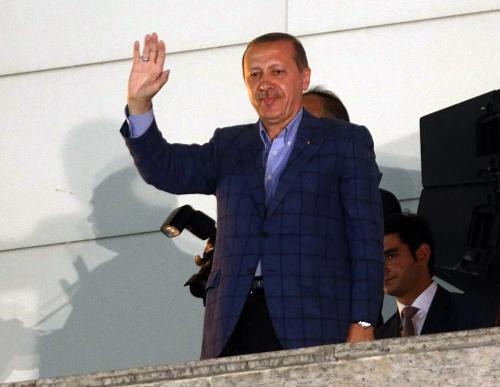Erdogan wins elections yet political uncertainty lingers in Turkey
 0 Comment(s)
0 Comment(s) Print
Print E-mail Xinhua, August 12, 2014
E-mail Xinhua, August 12, 2014
|
|
|
Newly elected Turkish president Recep Tayyip Erdogan waves at supporters from the balcony of the AKP party headquarters during the celebrations of his victory in the presidential election vote in Ankara on August 10, 2014. [Xinhua photo] |
Later a corruption investigation, which surfaced in Dec. 2013, also implicated senior officials in government and Erdogan's family members. He was accused of suspending the rule of law to hush-up corruption allegations.
Deputy of the opposition Nationalist Movement Party, Cemalettin Simsek, said Erdogan desperately wanted to become president to escape from corruption allegations.
According to Turkish penal code, the president of the country can only be tried for a crime of treason. He has full immunities against other incriminations.
"He (Erdogan) sees the presidency as a protective armor," Simsek said.
Controversy over party ties
Former Justice Minister Hikmet Sami Turk says that now that Erdogan is officially president, he should sever ties with his party.
"It would be wrong for him both in terms of law, politics and ethics to interfere in the selection of the new prime minister and party leader," Turk said.
Article 101 of the Turkish Constitution states that once a person is elected president, his or her ties to their party, and their membership in Parliament, should discontinue.
Serap Yazici, a professor of constitutional law, says Erdogan's aspiration to shape the governing party and the government before assuming presidency is not lawful, saying that "he should no longer act like the leader of a political party."
Meanwhile, some analysts and observers have speculated that outgoing President Abdullah Gul may become a new rival for Erdogan in the race to gain party influence.
Gul said on Monday that he would return to politics and the ruling Justice and Development Party (AKP).
"I am still president until end of the month. No doubt that I will return to my party as my presidency ends. This is only natural for me," Gul told reporters at a farewell reception at the presidency, a signal that he will pursue the post of next prime minister.
"After founding our party, I was the first prime minister and then first president. I am happy that my party brings out the second-president," he added.
His remarks came at a time when the AKP's highest decision- making body was discussing Erdogan's successor and party's road map for electing a new chairman, who will also be the next prime minister. A ruling party official told Xinhua on the condition of anonymity that "Erdogan wants to control both presidency and the government ... yet Gul, supported by other heavyweights in the party, wants to challenge that ambition of Erdogan."






